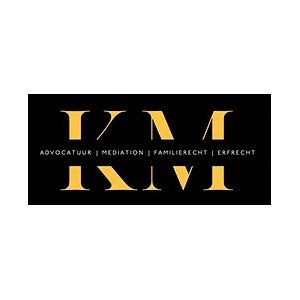Best Inheritance Law Lawyers in The Hague
Share your needs with us, get contacted by law firms.
Free. Takes 2 min.
List of the best lawyers in The Hague, Netherlands
About Inheritance Law in The Hague, Netherlands
Inheritance law in the Netherlands is governed primarily by the Dutch Civil Code, particularly Book 4 (Erfrecht). In The Hague, as the seat of many national courts and a hub for notaries, individuals often handle succession matters through official channels like the Court of The Hague and notaries who draft wills and administer estates.
Key ideas include how a will distributes assets, how intestate succession works when there is no will, the rights of surviving spouses, and the process to settle an estate after a death. Notaries in The Hague frequently manage testament drafting, estate inventories, and the formal steps to open and close an estate with court involvement as needed.
Understanding Erfrecht also means recognizing the role of taxes, probate procedures, and the protection of legitimate rights for heirs. The Hague residents often navigate these processes with legal counsel to ensure compliance with procedural rules and to avoid avoidable delays.
Why You May Need a Lawyer
The following real-world scenarios in The Hague commonly require Inheritance Law expertise from a legal counsel or solicitor.
- A surviving spouse disputes a recently drafted testament that appears to diminish their share and requests a legal review of the will's validity.
- Several heirs disagree on how a deceased’s assets should be divided, triggering negotiations and, potentially, a court case at the Rechtbank Den Haag.
- A deceased person owned property both in the Netherlands and abroad, creating cross-border succession issues that require Dutch and international private law analysis.
- An executor or beneficiary needs to understand and apply for tax relief and filing under the Successiewet 1956, including how assets are valued for inheritance tax purposes.
- You are considering a last will and testament and want to ensure the document minimizes disputes, with a notary in The Hague who can advise on Dutch formalities and registration.
- There is a potential claim of legitieme portie for children or other forced heirs, requiring careful legal assessment of rights and possible adjustments to distributions.
Local Laws Overview
Burgerlijk Wetboek Boek 4 Erfrecht
This is the core source of Dutch inheritance law. It governs how succession is opened, who inherits when there is a will or when there is no will, and how debts and assets are distributed among heirs. The Hague courts frequently interpret Boek 4 in post-mortem settlements and in disputes between heirs.
Key concepts include testament validity, renunciation of inheritance, and the process for opening a succession with the court or a notary. The Civil Code provisions interact with tax rules and with the role of executors and guardians when minors or incapacitated persons are involved.
Successiewet 1956 (Inheritance Tax Act)
The Successiewet governs inheritance and gift taxation in the Netherlands. It determines how different classes of heirs are taxed and what exemptions and reductions may apply. Tax planning for estates often requires careful coordination with tax authorities and the notary to optimize liabilities.
In The Hague, residents commonly review the tax implications of estate distribution as part of the probate process. The tax rules can influence whether certain assets are liquidated to fund taxes or preserved for heirs.
Wet op het Notarisambt (Notaries Act) and Notarial Practice
Notaries in The Hague perform critical roles in estate planning, opening succession, and executing wills. The Notaries Act regulates notarial qualifications, duties, and conflict handling. A qualified notary ensures the will is legally valid and that the estate is settled correctly after death.
The interaction between notaries and courts is frequent in complex estates, especially where cross-border elements or disputes arise. A reliable notary can prevent many common pitfalls that delay probate or provoke challenges from other heirs.
“The Netherlands uses a civil law system where a notary is central to drafting a will and supervising estate administration.”
Source: https://www.rechtspraak.nl (official judiciary information) and https://www.belastingdienst.nl (Dutch Tax Authority) provide authoritative context on practical procedures and taxes; consult these sites for official guidelines and updates.
Frequently Asked Questions
What is Erfrecht in the Netherlands?
Erfrecht is the Dutch law that governs how a person’s estate is distributed after death. It covers wills, intestate succession, and the rights of heirs and surviving spouses.
How do I start a succession in The Hague?
Typically you work with a notary to open the estate. The process may involve filing documents at the Court of The Hague if disputes arise or if court approval is needed for settlement.
What is a will and how should it be prepared?
A will is a formal document expressing how assets should be distributed. In the Netherlands, a will is usually drafted with a notary to ensure validity and enforceability under Boek 4 Erfrecht.
How much does inheritance tax cost for my case?
Inheritance tax depends on the relationship to the deceased and the value of the estate. The tax rules are set by the Belastingdienst and can vary by asset type and exemptions.
When does probate typically take in The Hague?
Probate times vary by complexity. Simple estates may resolve in a few months, while disputes or international elements can extend to 12 months or more.
Do I need a lawyer if the estate is straightforward?
A lawyer can help review documents for legal validity, advise on the legitimate rights of heirs, and prevent disputes. Notaries often handle straightforward matters, but legal counsel adds assurance.
Is cross-border succession handled differently?
Yes. Cross-border estates involve international private law. The Hague often requires coordination between Dutch authorities and foreign jurisdictions to determine applicable law and asset transfers.
What’s the difference between a testator and an executor?
A testator creates a will. An executor administers the estate according to the will or Dutch law, with duties including inventory and debt settlement.
Can I challenge a will if I suspect invalidity?
Yes. A party who has legal standing can challenge a will in court if there are grounds such as coercion, fraud, or lack of testamentary capacity.
Should I accept or renounce inheritance?
You should consult a lawyer to assess benefits and liabilities, including debts and taxes. Renunciation is possible under certain conditions and timelines.
Do I need to involve a notary for every inheritance issue?
Not always, but for most formal steps like opening a succession, creating a will, or transferring real property, a notary is highly advisable in The Hague.
Additional Resources
- Rechtspraak.nl - Official Dutch judiciary portal with information on court procedures and case law, including matters heard by the Court of The Hague. https://www.rechtspraak.nl
- Belastingdienst - Dutch Tax Authority providing guidance on inheritance tax, exemptions, and filing requirements for estates. https://www.belastingdienst.nl
- Rijksoverheid - The official Dutch government portal with general information on Erfrecht, notaries, and civil law matters. https://www.rijksoverheid.nl
“Official guidance on probate, taxes, and court procedures in the Netherlands is published by the Dutch judiciary, the tax authority, and the government portal.”
Next Steps
- Identify your inheritance issue and determine if you need a notary, a lawyer, or both in The Hague. This helps align expectations and costs.
- Gather key documents, including the death certificate, will (if any), and asset records. Prepare a list of heirs and potential disputes.
- Consult a Dutch solicitor or notary with expertise in Erfrecht to review the will, potential claims, and tax implications. Request a written plan and timeline.
- Decide on a course of action with the professional, including whether to open a succession with the Court of The Hague or proceed through a notary. Set a target start date.
- Have the documents drafted or reviewed, and file with the appropriate authority if required. Expect initial actions within 2-6 weeks after engagement.
- Monitor tax requirements and deadlines with the Belastingdienst, and adjust the estate plan or filings as needed. Prepare for annual tax obligations if relevant.
- Keep records of all fees, filings, and court orders. Schedule periodic follow-ups with your legal counsel to manage possible disputes or appeals.
Lawzana helps you find the best lawyers and law firms in The Hague through a curated and pre-screened list of qualified legal professionals. Our platform offers rankings and detailed profiles of attorneys and law firms, allowing you to compare based on practice areas, including Inheritance Law, experience, and client feedback.
Each profile includes a description of the firm's areas of practice, client reviews, team members and partners, year of establishment, spoken languages, office locations, contact information, social media presence, and any published articles or resources. Most firms on our platform speak English and are experienced in both local and international legal matters.
Get a quote from top-rated law firms in The Hague, Netherlands — quickly, securely, and without unnecessary hassle.
Disclaimer:
The information provided on this page is for general informational purposes only and does not constitute legal advice. While we strive to ensure the accuracy and relevance of the content, legal information may change over time, and interpretations of the law can vary. You should always consult with a qualified legal professional for advice specific to your situation.
We disclaim all liability for actions taken or not taken based on the content of this page. If you believe any information is incorrect or outdated, please contact us, and we will review and update it where appropriate.










